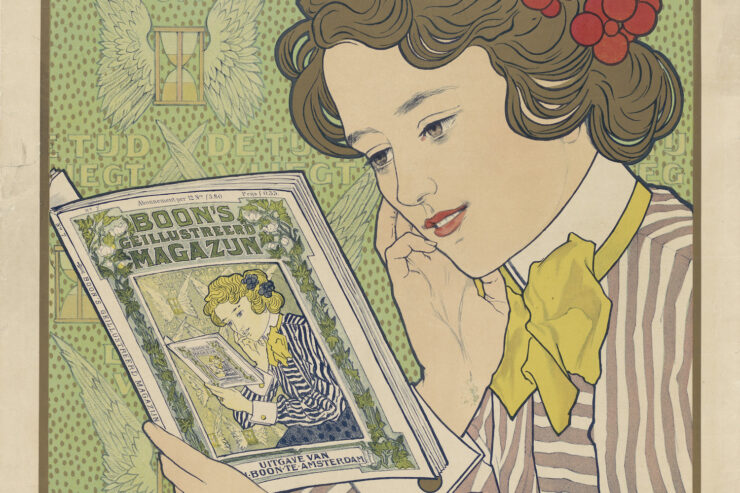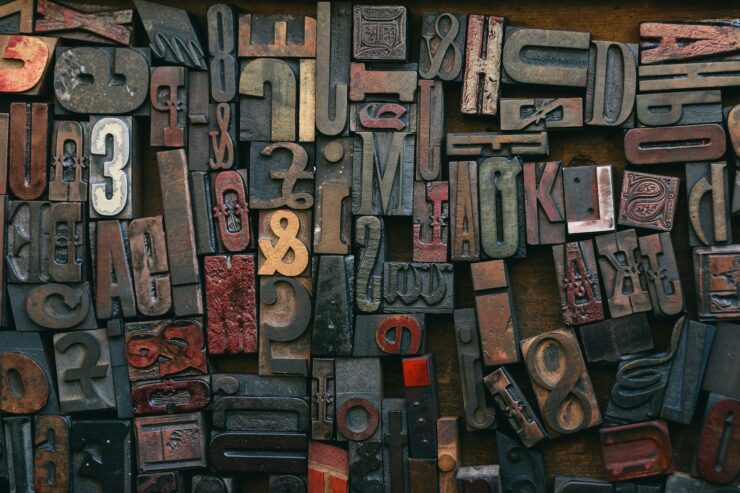’Tis the season for lists, and I don’t mean the checking-it-twice kind. Best books lists, best movies lists, best games, best best-of lists, best reviews, best cookbooks, best albums, best songs. You name it, and there’s a list for it.
I love a list except when I don’t. A good list is personal and knows it. A bad list is one of those clickbaity rankings of superhero movies, or Star Wars movies, or other things that it should frankly be illegal to rank at this moment in time. A great list breaks the rules—like Leah Schnelbach’s list ranking all the superhero origin movies they could remember. What did I just say? I said no more superhero ranking lists. But this one is what a good list should be, what it can be: Personal, clearly subjective, unexpected, and fun.
I used to have to make a ranked list every year—my top ten movies, and then ten more for good measure (and because ten is never enough). I agonized over this list. I spent hours and days and weeks trying to cram in viewings of all the movies I had not yet seen in a given year. (It is, to put it lightly, challenging making a complete movie ranking list in a small town that doesn’t get many independent films until months after their big-city releases.) Now I bask in the simplicity of our Reviewers’ Choice lists, which do not require ranking and can be as personal and loose as we wish.
But I also like other lists. Personal, subjective, unexpected, fun lists. So here are several lists made up of books I read this year. They were made using a small number of simple rules: Not everything I read is on one of these lists, but every book I read this year, regardless of publication date, could be included. Each book can appear only once. Each list can have a maximum of five books on it. And sometimes, a list is just one thing.
Three Excellent Series Books
- The Witch of Maracoor, Gregory Maguire (2023)
- Blade of Dream, Daniel Abraham (2023)
- Mammoths at the Gates, Nghi Vo (2023)
The Witch of Maracoor ends a series that is not going to go down easy for every lover of Maguire’s Wicked—but the thing is, you should try it, you should let it unsettle you, you should see what happens to Rain. Do it for Elphie, do it for Rain, do it for all the girls burdened by hope and ancestry and loss and discovery. Blade of Dream is the middle book of Abraham’s masterful Kithamar trilogy, but you could probably read it first, and in fact I wish I could have the experience of reading each of the books in this not-yet-complete trilogy first. If only! As for Nghi Vo, every single book of hers is worth your time, and this entry into the Singing Hills cycle was particularly elegant and affecting at once. I hope this series never ends.
Five Books I Should Have Read a Long Time Ago
- Black Sabbath’s Master of Reality, John Darnielle (2008)
- The Night Circus, Erin Morgenstern (2011)
- The Revolution of Every Day, Cari Luna (2013)
- The Folded Clock, Heidi Julavits (2015)
- Dear Mr. You, Mary-Louise Parker (2015)
A wonderful thing about books that will become important to you is that you can read them whenever. When they come out, sure, but fifteen or forty years later is fine, too. That said, I still feel a ridiculous urge to apologize to the authors of books I should have read a million years ago. Sorry, Erin Morgenstern; your book is everything everyone told it would be, and I wish I’d had it in my brain this whole time! Sorry, John Darnielle; I know you’re a genius but I just kept wondering if I wanted to read about Black Sabbath, when the answer was clearly, “Yes, when Darnielle is writing about them!” Sorry, Cari Luna, who is also an excellent writing instructor; I should have read this book the minute it came out, because it’s just great and also it’s my old neighborhood through new eyes! Sorry, Heidi Julavits, I should have listened to my friend David about this genius book! And sorry, Mary-Louise Parker; I was being a dick and had doubts about a book by an actor, but this book made me cry more than once, and made me think even more times! Please write another one.
Let’s All Read More Books About Art
- Monsters, Claire Dederer (2023)
- Thirteen Ways of Looking at the Novel, Jane Smiley (2005)
- Appropriate: A Provocation, Paisley Rekdal (2021)
- Thin Skin, Jenn Shapland (2023)
If I were to recommend one single nonfiction book from this year, it would be Monsters, which I have talked about on and off in this column since I started it. It is just that good. If you had told me some years ago that I would love a Jane Smiley nonfiction book about the novel, I would have been confused, because I have never otherwise read Jane Smiley. But this deep dive is an absolute treat for thinking about form and style and what makes a book a novel. And this Paisley Rekdal book? Sharp, thoughtful, difficult, considering, full of questions, full of every bit of nuance missing from a million online discussions.
I also have to mention Jenn Shapland’s Thin Skin, which is not just about art, but it is about living, and making art, and writing and trying to exist in a world that would often like us to stop thinking about the weird feelings it causes. I will follow Shapland to any topic; I learned that with her first book, My Autobiographies of Carson McCullers, which was ostensibly about an author I had never read but was, in fact, about so much more. This kind of expansive nonfiction makes me feel like the world is bigger every time I read it.
One Book From Which I Learned Something I Did Not Know That I Did Not Know
- The Glass Hotel, Emily St. John Mandel (2020)
I did not fully understand the term “Ponzi scheme,” despite reading it in the news approximately seven thousand times, until I read this book. It is a very, very, very good book, but for some reason I wanted to note this thing that I did not expect to learn from it. You just never know what you’ll take away from a great book, is all.
Two Books by One Criminally Under-read Author
- Trouble the Saints, Alaya Dawn Johnson (2020)
- The Library of Broken Worlds, Alaya Dawn Johnson (2023)
Trouble the Saints won the World Fantasy Award, yet I feel as if it also, quietly and frustratingly, faded from view too quickly. The Library of Broken Worlds is this year’s City of the Uncommon Thief for me—a young adult novel that crosses genre boundaries, reading-age boundaries, boundaries of how you can tell stories about teenagers, stories about stories, stories about impossible places and the lies our parents taught us and the difficulty of bringing truth to light. Among other things. This book needs more champions. I hope it will find the readers who will need it, and who will love it.
(Some of) The Most Excellent Books I Read This Year That Came Out Last Year
- The Spear Cuts Through Water, Simon Jimenez (2022)
- Wolfish, Christiane M. Andrews (2022)
- The Visitors, Jessi Jezewska Stevens (2022)
- Body Work, Melissa Febos (2022)
- Ducks: Two Years in the Oil Sands, Kate Beaton (2022)
These five books are impossible to pithily cover in a paragraph because they have nothing to do with one another except that they came out in the same year. The Spear Cuts Through Water is, I think, the great overlooked novel of 2022, the one that should have been everywhere, but it’s really long and somewhat challenging and you have to trust the person who says, as they shove it into your hands, “You really, really have to read this.” I still feel that this book could rewrite what fantasy is, as a genre, if only we would let it.
Wolfish is a beautiful middle-grade novel that exists so fully in the natural world that I can’t think of it without thinking of textures: fur, dirt, worms, stone, mud, sheep. The Visitors is a book so fascinating and unexpected that I think I need to read it again. Body Work is necessary reading for writers, a craft book about the personal that reminded me how joyous it is to learn. And Ducks just broke me. Never underestimate Kate Beaton. Never.
One Absolute What the FUCK? Book
- The Engagement, Chloe Hooper (2012)
How is this book not a movie? How is this book even a book? How did Chloe Hooper write the breathtaking nonfiction work The Tall Man and then this unnerving psychological thriller? No, it’s not speculative. No, I don’t care. I need someone to read it. I need to talk about it. It’s under my skin and it itches.
Two Beloved Poetry Collections
- Tanya, Brenda Shaughnessy (2023)
- I Do Everything I’m Told, Megan Fernandes (2023)
Here’s the thing about poetry, No, two things: I don’t read enough of it, and I am incoherent about it when I do. But I first read Brenda Shaughnessy over twenty years ago, and lately I have grown determined to read all the books of hers that I missed between Interior with Sudden Joy and now. Tanya is, like all her work, beautiful, and lingering. And as for Megan Fernandes, there is no chronicler of modern living quite like her. She can be sharp, she can be clever, she can be wise and desperate and funny and there is nothing she’s afraid to write about.
Five Brilliant Debut Novels (And One Story Collection)
- I Keep My Exoskeletons to Myself, M. Crane (2023)
- Some Desperate Glory, Emily Tesh (2023)
- Jonathan Abernathy You Are Kind, Molly McGhee (2023)
- The Saint of Bright Doors, Vajra Chandrasekera (2023)
- Drinking From Graveyard Wells, Yvette Lisa Ndlovu (2023)
This was, in fact, the hardest list to keep to five books, but I made the rules and I’m going to stick to them. Here you have unexpected and uneasy dystopias, brainwashed soldiers, desperate debtors, unchosen ones, and a child with two shadows; you have books published as SFF, books published as literary fiction, and one short story collection from a university press that simply needs to get the attention of a big-publisher book. I started my year with Exoskeletons and ended it with Some Desperate Glory and Jonathan Abernathy; in between I was knocked sideways by Bright Doors and Graveyard Wells. I specify this timeframe because while I think you should read all of these books, I also think you should give them breathing room. Read one, and let it settle. Let it sink. Let it percolate and grow into your mind.
***
What lists would—could—you make from your year in reading?
Molly Templeton lives and writes in Oregon, and spends as much time as possible in the woods. Sometimes she talks about books on Bluesky.














